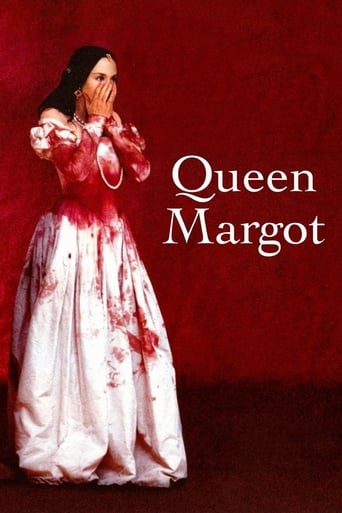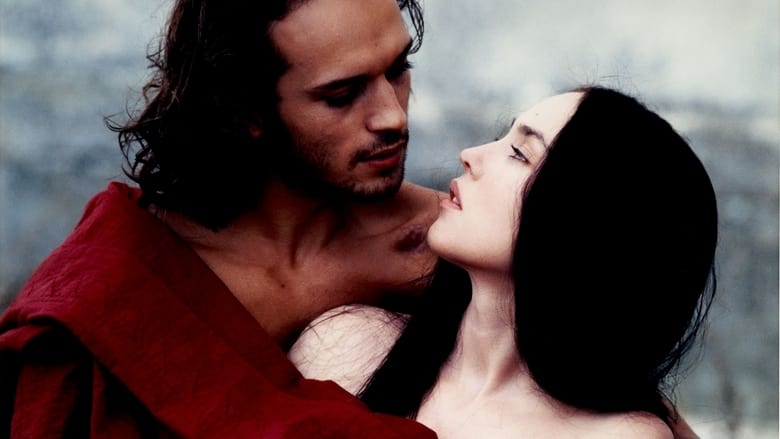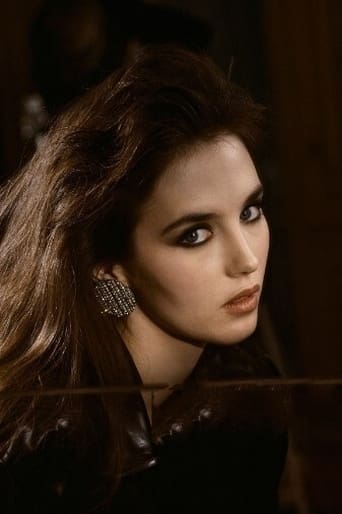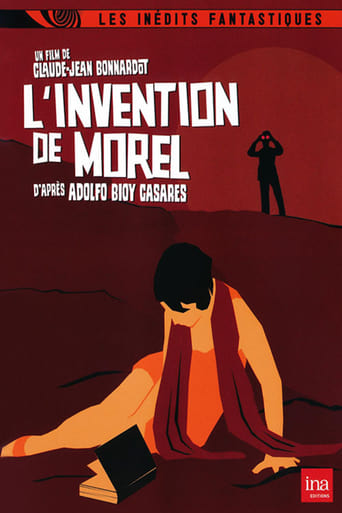Queen Margot (1994)
Paris, Kingdom of France, August 18, 1572. To avoid the outbreak of a religious war, the Catholic princess Marguerite de Valois, sister of the feeble King Charles IX, marries the Huguenot King Henry III of Navarre.
Watch Trailer
Free Trial Channels
Cast


Similar titles

Reviews
What makes it different from others?
Overrated and overhyped
I think this is a new genre that they're all sort of working their way through it and haven't got all the kinks worked out yet but it's a genre that works for me.
The movie's not perfect, but it sticks the landing of its message. It was engaging - thrilling at times - and I personally thought it was a great time.
I give this film a 7.5, but without fractions I'd have to round it up to 8.This is a big budget film, an $18m film, which in today's dollars is around $30m. Considering that production costs are lower in France, this film would cost much much more in the US. It looks expensive.The costumes, sets and everything, look completely realistic, which is a big feat. Many productions making period pieces fall into cheap, Halloween-costume territory or incredibly pristine, clean and freshly-pressed cosplay-like costumes. It's easy to look like a clown, especially with costumes from that time, but they didn't. They look very real.The fighting and murders look very convincing as well. It is not too gruesome, but quite long. I know that shorter versions of this film exist, but I don't say "cut, cut, cut" but montage. A faster-paced montage could've told us the scale of the murders without having to spend so much time showing each individual kill.The music by Bregovic is brilliant. His adaptation of Balkan folk songs, Balkan rock, Serbo-Croatian, Gypsy and other influences and adapt them in a renaissance style gave this film a unique feeling and mood. I'm glad they didn't just take some standard renaissance music or make a soundtrack from Celtic and French music of the era.The acting is very good, as is the story, but I was expecting more of an ending. I wish we had told in text that the prophecy had come true and that Catherine de Medici's sons bore no heirs, leaving the throne to Henri. This is a strange omission, especially since they had a scene specifically telling us of the prophecy.I wish France, or anyone really, would make more films like this, but people want more Warcraft and less drama.
I love well done historical fiction and films. This one is excellently done, in it's acting, sumptuous sets, costumes, lively pace and adventure and occasional high violence. It's also sensually smoking, with the gorgeous and intensely passionate and feminine Adjani holding nothing back. She even manages at twice the age to look almost young enough to play 19 year old Margot at her wedding.It's a fairly easy film to enjoy if you don't worry too much about the plot turns and detailed historical machinations, and even more rewarding to watch several times or more seriously, especially if you do some background reading at Wikipedia or elsewhere.Its historical accuracy is however a decidedly mixed picture. The sense of 16th century French court life, the major historical events including the massacre, and almost all the major figures are quite accurately portrayed. Even such figures as the Protestant Admiral Coligny and Guise, Margot's principal lover at the time of her arranged marriage, are accurately portrayed. De la Mole seems to be either wholly or largely invented, but it's common for more wholly personal charters to be in historical fiction and that's generally fine with me. So too is it here, except in essence it portrays him as the love of her life whereas she doesn't seem to really have had one.The film though seeks not merely to view Queen Margot and her voluminous affairs sympathetically, but to entirely lionize her for invented reasons. Given that she's the principal character in the film and not a trivial historical figure, that's not unimportant. While not hiding the fact that she never loved her husband and had many lovers, it did soft peddle her pronounced and highly indiscrete promiscuity, and largely invented both her "sisterly" loyalty to her husband, and tolerant and humanitarian heroic acts on behalf of him and the Protestant Huguenots more generally.Following Dumas it seeks to portray her as a woman who loyally and enduringly loved a man through thick and thin, just not the man she was forced to marry, but instead the minor Huguenot la Mole. In fact Margot's relationships seemed to have been if often passionate, also often simultaneous, overlapping, in quick succession, and not especially marked by enduring loyalty. If the contemporary portraits at Wikipedia can be believed, she while attractive was also not the transcendent beauty that is Adjani, though I hardly complain that Adjani was chosen. I'm not condemning Margot's sexual voraciousness but I am saying that the whitewashed, false and sanitized view of it here is rather in the nature of propaganda or myth. At one point for example la Mole says she's been fated to have lovers who die off on her, which seems to have had little basis.It was not unaccepted at the time for queens or female aristocrats in passionless arranged marriages to have lovers, but they were generally supposed to do so discretely, in a way that did not bring ridicule or dishonor to their husband, if honorable. Husbands too, though admittedly more universally tolerated in having affairs, were supposed to honor their wives. Both were also expected to try for some sort of marital love or at least a kind of intimate respect, and to attempt to produce legitimate heirs. Queen Margot seems to have never done any of this, or certainly not much. Most unreformed male libertines who accomplish little aren't so loved either.It's not clear she ever accomplished much, including having any children, not to mention any heir to the French throne which she could have done (unless as seems likely she was, or became, barren - STD's?).More important though is the way the film seeks to portray Margot as a heroine to the persecuted Huguenots, not because she believed in their religious cause, but because she was a firm believer in tolerance and humanitarianism, or became both after witnessing the massacre. Both were true of her husband Henri, who acted upon them especially after becoming "the Good" King Henri of France, but I see little evidence they were of Margot. Instead I strongly suspect she was lionized by Alexandre Dumas, and likely by earlier Huguenot tales, traditions and perhaps lesser novels, in aide of gallantry, the Huguenot and liberal cause and their integration into French national affection. (There was after all, they said, at least one good French royal at the time of the St. Bartholomew's massacre.) This seems built largely on Queen Margot's being the one member of the French royal family who wasn't intent on persecuting the Huguenots, since her interests were rather elsewhere than religion, politics or idealism.As well her close personal, "sisterly", relationship with her husband seems to be almost or entirely invented by Dumas, in service of our sympathy for her. Instead Henri several times provided sanctuary to her when she had nowhere else to go, despite their at best strained and tempestuous and thereafter icy relationship. Henri did not in fact seek to bring Margot to Navarre with him when he fled Paris nor did she want to go, with or without her lover(s). Instead several years later she partly fled there from her brother King Henry III of France (who takes power as the film ends) and was partly banished due to her increasingly scandalous and heedless behavior. Again much later, when she had long been divorced from Henri and grown old, isolated and nearly penniless, in an act which speaks much more about Henri's character than their relationship, Henri brought her back to the French court, where she eventually had some role in helping care for his children by his second wife. I've also seen no evidence she helped Henri escape to Navarre or before that convinced him to convert to Catholicism to save his life.I can see much reason to understand and have some sympathy for Queen Margot, but little reason to view her as a heroine.
I can't recall ever being disappointed in a film written by Daniele Thompson who has gone on to prove herself a brilliant writer-director also. Nothing if not versatile she began with one of the biggest box-office hits in French cinema, La Grande Vadrouille, which is still being revived close to half a century later and continued in comedic vein with such titles as Les Folies de grandeur and The Adventures of Rabbi Jacob whilst along the way launching the career of Sophie Marceau via La Boum - if these two ladies were fillies rather than filles we could employ handicapper terms to note that Marceau has just released her own second film as writer-director - before turning serious as she does here and also with Those Who Love Me Can Take The Train. This time around she is working with historical facts as distorted through the prism of Alexander Dumas and giving them a new coat of paint before setting them before Isabelle Adjani, Virna Lisi, Daniel Auteuil, Jean-Huges Anglade, Pascall Greggory, Vincent Perez and, if you're paying attention to every frame, Valeria Bruni-Tedeschi, all of which, with the possible exception of Perez, turn in fine performances modulating toward the exceptional in the case of Virna Lisi's Catherine de Medici. The plot has been discussed elsewhere so suffice it to say that as costume dramas go this is among the best even if the direction is the odd light year behind Thompson's screenplay.
I don't pretend to know the minutiae of the historical record, but it was Definitely Not Dumas, or I lost it all in the English translations! Like many others I've always been fascinated by this episode in French history, a turbulent and savagely intolerant period and not only in France, but 1572 is yet another year that went down in infamy. This film portrays the complicated machinations performed by Catherine de Medici and her cohorts in furthering her Catholic ambitions for her country and debauched family against the perceived threat of dour Protestantism, and centred around the St. Bartholomew Day Massacre.It's the rather beautiful Isabelle Adjani's stunning performance as Queen Margot that can leave you as breathless as she often is in the film, without her it would have been a much poorer film. She seemed to live the part, with every emotion imaginable on display. Would French breathlessness, or those huge rustling dresses sound as good dubbed into English?! On the other hand the rest of the cast are superb in their roles too, but especially Daniel Auteuil as Henri de Navarre and Jean Hugues Anglade as Charles IX, making them both extremely believable sympathetic characters when they weren't. The bloodbath and the anarchy of the Massacre and aftermath is vividly presented we are not spared a single thing in the entire film, all manner of violence and depravity is non-gratuitously displayed. It's impossible to convey a part of what happens in this film the same as it must have been impossible for the film to convey a fraction of what happened in that era too: it really is a must-see. I've seen it a number of times now since 1994 and I find something new I hadn't spotted before every time. It's a film that can make you realise (if you didn't before) that millions of ordinary folk all around the world could and still can believe in such arrant religious nonsense to the point of committing multiple ghastly murders in the name of empty air.Apart from all that, it's a beautifully crafted film, the best of its kind there's ever been.

















